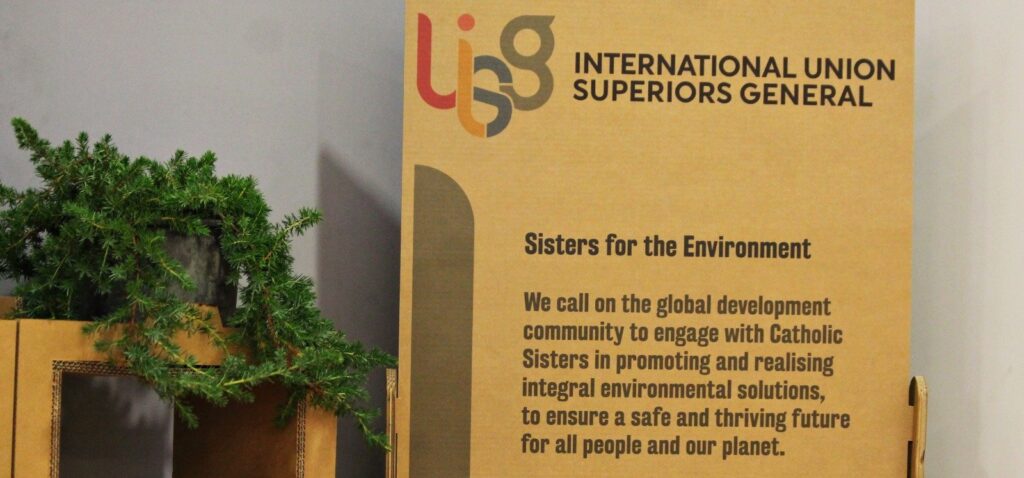 (AGENPARL) - Roma, 3 Novembre 2022
(AGENPARL) - Roma, 3 Novembre 2022[lid] 03 novembre 2022 –
The International Union of Superiors General (UISG) asks to “integrate the
voices of marginalised communities in the global debate concerning the
environment”, representing over *600.000 Catholic Sisters* who work in the
field of healthcare, childcare and the fight against hunger. It does this
through the Statement *“Sisters for the Environment: Integrating Voices
from the Margins”, *launched on *Thursday, November 3rd *at the UISG
headquarters in Rome, Lungotevere Tor di Nona 7, with the support of the
Global Solidarity Fund (GSF). The presentation of the Statement was
livestreamed on the official YouTube channels of UISG (
http://www.uisg.org/it/youtube-channels) in four languages: English, Italian,
Spanish and French.
“It is necessary to *listen carefully to the voices of those affected by
environmental disasters* – the text states – both in recognition of their
dignity as human beings and, with a pragmatic approach, to learn from their
resilience. Those most vulnerable must be integrated as key actors within
institutional frameworks, ensuring that their voices are central to the
global dialogue for change and not relegated to peripheral and isolated
advocacy. In particular, the suggestions of indigenous communities to stop
or modify projects affecting their lands must be taken on board, ensuring
that the expert opinion of communities is part of efforts to mitigate
climate change and the collapse of biodiversity”.
Two other key points of the document concern the need *to integrate
responses to climate change and biodiversity loss,* recognising the
interconnected nature of ecological challenges, and to *connect care for
the environment with care for the weak*, rejecting the anthropocentric
vision ‘at the root of the most destructive consumer habits’.
Inside the Statement is the call for women religious to “act quickly to
halt the collapse of biodiversity, ensuring that, by 2030, at least half of
the Earth and oceans become protected areas, restore devastated ecosystems
and reduce global dependence on fossil fuels”. But also the call to *’reach
global consensus on the Fossil Fuels Non-Proliferation Treaty*, and sign
the agreement of a new global framework for biodiversity’.
On the one hand, the declaration addresses the current emergency by
identifying COP27 on climate change and COP15 on biodiversity as essential
opportunities to reverse the trend that is destroying the Earth. On the
other, it expresses the deep-rooted and faith-driven vision for ecological
conversion that has inspired the sisters’ mission for decades, and still
continues around the world.
*Five stories have been chosen to recount the commitment of Catholic
Sisters *on the front line to safeguard the planet: Sister Anne Carbon in
the Philippines; Sister Jyotisha Kannamkal in India; Sister Nathalie
Kangaji in the Democratic Republic of Congo; the Sisters of Mercy of the
Americas (in English Sisters of Mercy of the Americas) and Sr Iraci de
Fátima Cirino dos Santos in Brazil. From working alongside the indigenous
Subaanen people, threatened by mining projects, to working to ensure
education and support for the most vulnerable communities. From legal
assistance to ensure that multinational cobalt companies respect the
environment and local populations to lobbying for the allocation of funds
to support low-income countries for climate change mitigation and
adaptation.
*”The essence of this declaration is based on the global experience of
activism and advocacy made with the Sowing Hope for the Planet campaign,”
said Sister Patricia Murray, UISG Executive Secretary. “Born in 2018, this
campaign has become a driving force within the Laudato Si’ Movement,
promoting a multitude of initiatives and good practices implemented by the
sisters and their partners in response to the Pope’s encyclical letter.”*
During her speech, the coordinator of ‘Sowing Hope for the Planet’ *Sister
Sheila Kinsey* illustrated some of the results achieved through
networking: *’We
have collaborated with land conservation groups to preserve native seeds,
mitigate damage from mining, plant trees for reforestation, cultivate
community gardens and protect the land and land rights of indigenous
peoples. With a focus on water issues, the Sowing Hope for the Planet
networks have promoted access to clean water, raised public awareness on
issues of pollution and water scarcity, advocated for legislation to
protect freshwater sources, secured wells and pipelines for communities
with limited access to clean water, and worked on projects to clean the
world’s oceans.” *
“*As the future of our Planet hangs in the balance, we know that reaching
the tipping point of change requires all people of goodwill to work
together across borders and identities, setting aside differences to defend
our common home*.” This was the final appeal of *Sister Patricia Murray*,
who emphasised that the declaration embodies this spirit of cooperation
that the sisters seek to promote, building on the collaboration between
UISG offices, partners and funders.
The event was also attended by *Sister Mary John Kudiyiruppil*, UISG Deputy
Executive Secretary; *Chiara Porro*, Ambassador of Australia to the Holy
See; *Maria Dolores Sanchez Galera*, Coordinator of the Research and
Reflection Unit of the Dicastery for the Service of Integral Human
Development; *Neil Thorns*, CAFOD Advocacy and Communications
Director; *Josianne
Gauthier*, CIDSE General Secretary; *Catalina Hinojosa Lopez*,
co-coordinator of the Agriculture and Justice Village of The Economy of
Francis; and *Sister Jean Quinn*, Executive Director of UNANIMA
International, who will be in attendance at the COP27 summit, becoming a
voice for the voiceless and bringing new hope for a more sustainable future.



